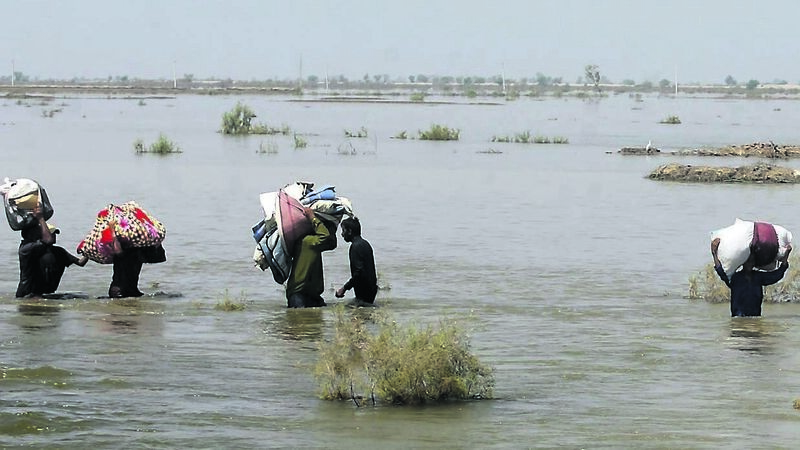Climate anxiety is a serious off-shoot of the uncertain world we're living in

Victims of heavy flooding from monsoon rains carry relief aid through flood water in the Qambar Shahdadkot district of Sindh Province, Pakistan in September. Scientists have said climate change no doubt helped swell monsoon rains this summer.(AP Photo/Fareed Khan, File)
At other times, you’re rinsing out an empty yoghurt carton and putting your recyclable waste into the appropriate bin, feeling that you’re doing your bit.
But such virtuous behaviour doesn’t exactly feel terribly effective when you turn on the news and hear about the latest climate change calamity.
When it’s somewhere like Pakistan, it feels far away. But that’s delusional thinking. It is on our doorstep. Literally. The rain is threatening to come in.
Or you may be unfortunate enough to own a business in Cork city in an area prone to floods. Either way, climate change is no longer something out there in the nebulous future. It’s happening.
It’s frightening, and in many ways, it seems like something about which we are powerless. (Keep recycling the food cartons, but could we also quit taking flights for holidays?)
Is it any wonder that we’re anxious?
Many people are experiencing climate anxiety. A study published in The Lancet last year found that 84% of people aged 16-25 from ten countries are at least moderately worried about climate change, while 59% are very or extremely worried.
As well as anxiety, many people, particularly young adults, are experiencing anger over inheriting a problem they did not create.
Who’d be a young adult in this country? Not only do they have to cough up to ensure older people get the state pension, but they have no guarantee of a state pension themselves.
But no matter how dire things are looking, it’s pretty futile to give into despair. Being consumed with negative emotions won’t achieve anything. You can rail against the world but you’ll just end up mired in misery.
Psychology can play a role in the fight against climate change by figuring out the most effective ways to change human behaviour and encourage us to take action.
It’s important to focus on this, as climate change is a growing threat to mental health.
Extreme weather events like wildfires and hurricanes can lead to depression, anxiety and post-traumatic stress disorder in people of all ages, especially when they are experiencing displacement and food insecurity.
Research shows that higher temperatures are associated with an increased risk of mental health-related hospital admissions.
Having “very powerful emotional responses” to the crisis is not unusual, said Professor Susan Clayton, from the psychology department at the College of Wooster in Ohio, who attended the American Psychological Association’s convention in Minneapolis in August. There, the spotlight was on climate change and psychology.
Professor Clayton said that those experiencing extreme emotions might benefit from counselling, as well as assurances that they don’t have to have all the answers.
Psychologists and others in leadership positions ought to remind people that “this is a systemic issue”. Some people struggling with climate anxiety may feel personally responsible for saving the world.
But that’s in the realm of a persecution complex and needs to be seen for what it is – an unnecessary worry with no basis in reality.
As Professor Clayton said, no individual should have to bear that weight on their shoulders.
As well as anxiety, many people, especially young adults, are experiencing anger over a problem they did not create.
Anger is an energy, as the punk song from Public Enemy goes, and can be a powerful motivator in getting people involved in trying to counter climate change. Look at Greta Thunberg. She has parlayed her anger into something positive and inspirational. She is not sitting back metaphorically rubbing her worry beads.
Professor Clayton says that parents shouldn’t lie to their children “because they’ll find out and that just undermines their trust”.
She says it’s important to take into account children’s emotional needs. “Please don’t tell them the world is going to come to an end.”
Instead, children who are directly or indirectly receiving messages about climate change need to be provided with emotional coping skills.
UNICEF suggests talking about steps the entire family can take together such as recycling, reducing food waste, saving water and planting trees. This is a good way of giving kids an outlet.
Parents and leaders, including psychologists, need to identify ways to promote advocacy from an early age.
The media coverage of climate change started with photographs of cute polar bears poignantly perched on their little melting ice spots.
Now, the coverage of everything from extensive fires in Southern Europe to drought in Somalia means there’s no escaping the crisis.







 App?
App?




